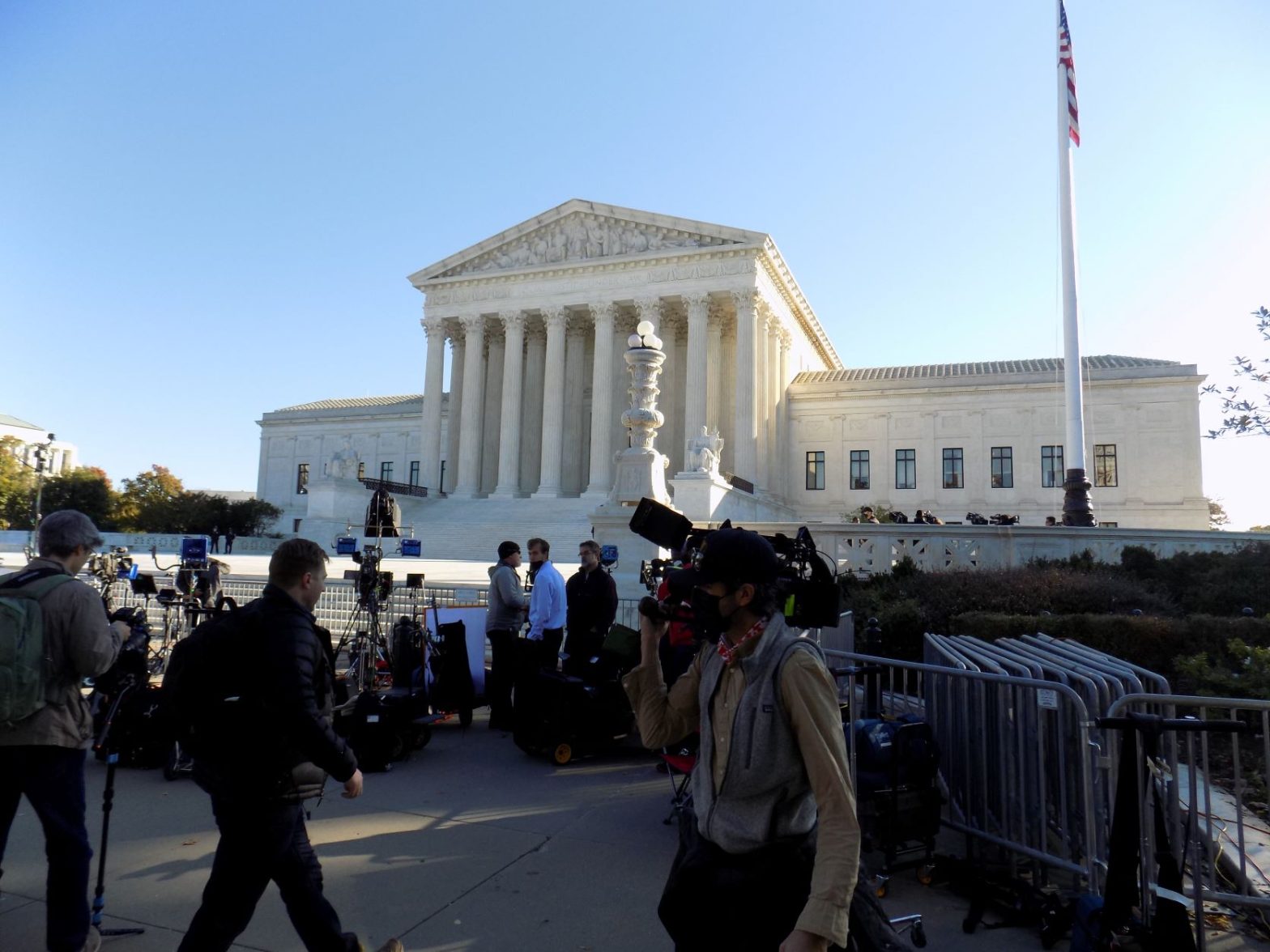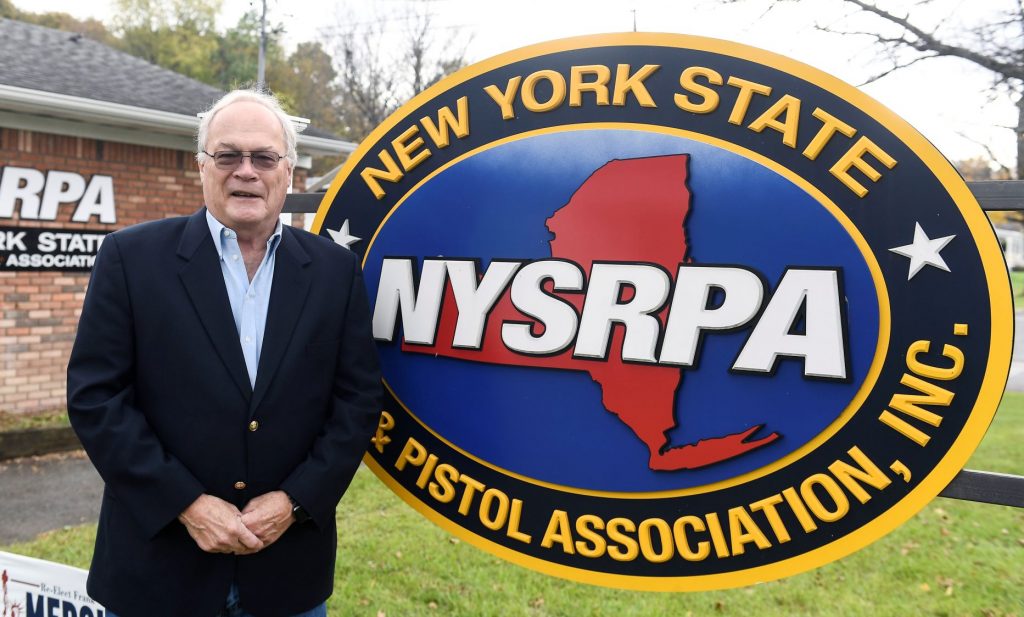Justices Sound Ready to Strike Down New York Gun Law

WASHINGTON — A New York law that strictly limits the circumstances under which gun owners can carry their weapons outside their homes seems unlikely to survive the scrutiny it received from the Supreme Court on Wednesday.
But the justices also seemed to be looking for a way to rule narrowly in the case, worried that a broad ruling could strike restrictions currently in place to protect those who rely on mass transit or patronize bars, restaurants and other public gathering places.
The New York law at the heart of Wednesday’s oral arguments has been on the books since 1931. It mandates that in order for an individual to carry a concealed handgun in public for self-defense, the person applying for a weapons license must demonstrate “proper cause.”
In other words, they have to show an actual need for carrying the weapon.
People who secure a gun license in New York State get either a “restricted” license, which allows them to carry a gun only under certain circumstances — like hunting or going to a local gun club or range for target shooting — or an “unrestricted” license, which gives them a broader ability to carry a weapon in public.
In the case before the court, both of the individual plaintiffs, Robert Nash and Brandon Koch, said they each requested a license that would have allowed them to carry a handgun in public for self-defense.
One received a permit to carry a gun to and from work, and both acquired licenses to carry weapons for hunting and shooting practice.
But both Nash and Koch, who are residents of upstate New York, claim they were subsequently denied the application on the grounds they failed to show “proper cause” to carry a firearm in public because each did not “demonstrate a special need for self-defense that distinguished him from the general public.”

The New York State Rifle and Pistol Association, an arm of the National Rifle Association, joined them as a plaintiff in the underlying litigation.
Paul Clement, arguing on behalf of the plaintiffs, said his clients are seeking nothing more than a right that “their fellow citizens and 43 other states already enjoy.”
Currently, the remainder of the states — California, Hawaii, Maryland, Massachusetts, New Jersey, New York and Rhode Island — restrict the carrying of guns to those who can demonstrate a particular need for doing so.
Connecticut and Delaware also have so-called “may issue” laws, though they are designed a bit differently than the law under scrutiny.
In a line of inquiry that could prove to be the foundation of the court’s ultimate decision in the case, Chief Justice John Roberts asked why anyone seeking a license to carry a gun in public for self-defense should be compelled to show a special need to do so.
“You can say that the right is limited in a particular way, just as First Amendment rights are limited, but the idea that you need a license to exercise the right, I think, is unusual in the context of the Bill of Rights,” he said.
But later, Roberts joined other justices in asking under what circumstances and in what locations the petitioners might concede guns should be prohibited.
“Can they [the state] say you cannot carry your gun any place where alcohol is served?” Roberts asked. “What about a football stadium?”
Clement responded by arguing restriction of access to an individual with a gun should be consistent with the way similar prohibitions have been handled in regard to government buildings and schools.
“They restrict access,” he said. “It is not just any member of the general public that can go into those places, with or without a gun. If you’re an adult that has no business being in a school, you’re excluded. So I think that’s a factor that would support treating that as a sensitive place.
“A second principle that I would offer is these sensitive place restrictions really are a different animal than a carry restriction because I think a true sensitive place restriction is not just going to limit your ability to carry concealed, but it’s going to be a place where no weapons are allowed.”
Last, Clement drew an analogy to the nonpublic forum doctrine of the First Amendment.
Under that doctrine, he said, “You start with the place and you try to understand … given the nature of the place, its function, its restrictions on access … that weapons would be out of place there.”
But Justice Elena Kagan and others on the court remained unconvinced, and she was among those who asked whether guns could be barred at Yankee Stadium, Times Square on New Year’s Eve, civil protests and on college campuses like New York University and Columbia University.
Clement initially joked that “NYU doesn’t have much of a campus,” prompting Kagan to suggest he “go back to New York. I think you’ll find that’s wrong.”
“The point I’m trying to make, though,” he said, but Kagan cut him off. She asked if he was arguing that a state couldn’t say, “We’ve got 50,000 people gathering in one place — a ballpark — with people all on top of each other. … That we don’t want guns there … a state or a city couldn’t do that?”
Clement said in the case of a venue like Yankee Stadium, they might be able to, because you can’t get into Yankee Stadium without a ticket.
“Of course, I’d have to understand the specific jurisdiction. A lot of these stadiums are not run by the government anyway. So if a private entity wants to restrict access, I don’t know where the state action is?” Clement said.
“Suppose the state says no guns at protests or at an event attended by more than 10,000 people?” Kagan asked.
“I think that might be trickier,” Clement said. “Maybe they could justify it under strict scrutiny, but I don’t think that would qualify as a sensitive place restriction.”
“But why not,” Justice Amy Coney Barrett asked. “I mean, if you concede the historical record requires states to outlaw guns in sensitive places, can’t we just say Times Square on New Year’s Eve is a sensitive place because we’ve seen people gathered on top of each other and we’ve had experience with violence?”
“Here’s what I would suggest,” Clement said. “That the right way to think about limiting guns in Times Square on New Year’s Eve is not as a sensitive place but as a time, place, and manner restriction. And that might be a perfectly reasonable time, place, and manner restriction.”
Throughout the oral argument, the court’s liberals appeared willing to allow the state law to remain in place, especially focusing on differences between rural areas, like those the petitioners live in, and the state’s far more densely populated cities and suburbs.
But members of the court’s current conservative majority were far more skeptical of the law and its intent.
“Why isn’t it good enough to say ‘I live in a violent area and I want to defend myself?'” Justice Brett Kavanaugh asked at one point.
And Justice Samuel Alito wondered why only “celebrities, state judges and retired police officers” should be able to carry concealed guns, and not ordinary citizens.”
Alito said there already are people illegally carrying guns on subways and streets.
“But the ordinary hard-working, law-abiding people … they can’t be armed?” Alito asked.
New York says if the Supreme Court sides with the challengers to the law it would have “devastating consequences for public safety.” The Biden administration agrees.
The court hasn’t heard a Second Amendment case since it established an individual right to own guns in 2008 by a 5 to 4 vote in District of Columbia v. Heller.
That case, however, addressed only the right to keep firearms in the home for self-defense.
At the same time, even Heller indicated that many kinds of gun regulations are permissible.
“Nothing in our opinion should be taken to cast doubt on longstanding prohibitions on the possession of firearms by felons and the mentally ill, or laws forbidding the carrying of firearms in sensitive places such as schools and government buildings, or laws imposing conditions and qualifications on the commercial sale of arms,” the late Justice Antonin Scalia wrote for the majority.
The court’s only other Second Amendment case since then, McDonald v. Chicago in 2010, extended the Heller decision, which concerned federal gun laws, to state and local ones.
Dan can be reached at [email protected] and at https://twitter.com/DanMcCue
























